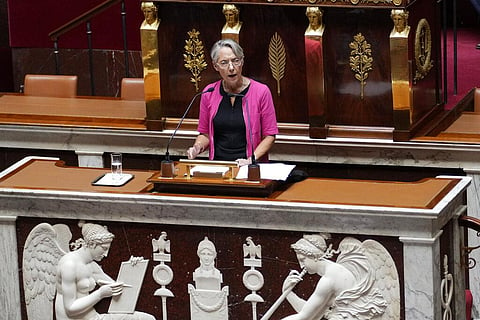

PARIS: French Prime Minister Elisabeth Borne survived a no-confidence motion on Monday in Parliament brought by an alliance of left-wing lawmakers shortly after the June elections and termed the no-confidence vote as 'political tactics'.
This non-confidence vote is just political tactics
The motion required an absolute majority of 289 votes for the government's fall. However, according to the media reports, only 146 lawmakers supported the motion.
Calling the no-confidence vote a political tactic, Borne urged the parliament to switch to a culture of compromise ahead of the vote. While the outcome was slightly doubtful, it was meant as a show of intent by the NUPES alliance, which is notably the largest bloc in opposition to Emmanuel Macron's centrist grouping.
The NUPES alliance, called the New Ecological and Social Popular Union, comprises 151 MPs.
As per the reports, five of the MPs of the NUPES alliance chose not to vote for the motion of no confidence.
"Ladies and gentlemen, today we could be working for the good of the French people," Borne told parliament ahead of the vote, adding that we are debating a no-confidence vote that is based on my alleged intentions and that stands in the way of Parliament's work and therefore of the wish of the French people.
"Instead, we are debating a no-confidence vote that is based on my alleged intentions, and that stands in the way of parliament's work and therefore of the wish of the French people," she said.
"This no-confidence vote is just political tactics ... Let's switch together to a culture of compromise," she added.
The parliament will soon start discussing the 20bn euro (USD 20.1bn) inflation-relief package unveiled last week by the government as the no-confidence motion is now out of the question.
Borne, 61, has made clear she intends to rely on the votes of opposition parties to pass legislation, with the right-wing Republicains party seen as crucial to her future in the French parliament.
Newly re-elected President Emmanuel Macron recently lost the absolute majority as the newly formed left-wing alliance government has gained the majority. The result provoked French politics and raised the question of the legislation and messy coalition.
Earlier, Macron's centrist alliance, Ensemble (Together), was ahead of the New Popular Environmentalist and Social Union (Nupes) of Jean-Luc Melenchon in the second round of parliamentary elections in France, according to CNN citing the results released by the Interior Ministry.
According to the result, Marcon secured 245 out of a total of 577. However, it still fell short of the 289-seat threshold for an absolute majority in the National Assembly, France's lower house.
NUPES came in second with 131 seats and became the main opposition in force in the country, though the coalition is expected to be divided on some issues once in parliament, according to the interior ministry's results.
Macron won in the second round of the presidential election with 58.55 per cent of the votes, while his rival, far-right presidential candidate, leader of the National Rally party Marine Le Pen got 41.45 per cent in April.